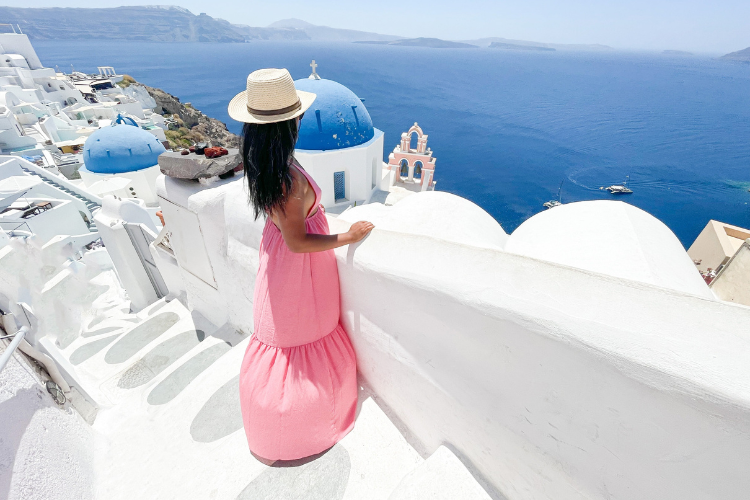The tourism industry is going through a period of transition. Staring the climate crisis, collapse of biodiversity, and global political divisiveness in the face, some might argue this is the most critical transition the industry has ever undertaken.
There is a growing awareness across all tourism sectors that the industry as a whole needs to become more equitable, inclusive, accessible, and culturally and environmentally aware — and take immediate action in that direction. Even though change often feels like it's happening at a glacial pace, the truth is that we are starting to see some major transformations in the way travel is packaged, marketed, and delivered to travelers. (Look at Uganda’s move away from the safari narrative, Venice’s day fee, and the proliferation of people’s history day tours as just a few examples.)
In order to fully realize and accelerate this transition, however, the tourism industry needs to embrace content creators as an integral cog in the industry wheel. The reach of travel influencer marketing is significant, and media coverage has been shown to change travelers’ behavior.
Travel content creators — whether they are travel writers, bloggers, videographers, or social media influencers — are a vital link in the tourism ecosystem. They help service providers like hotels and tour operators, as well as destinations reach potential travelers. And, conversely, by sharing inspiration and information about where they go and what to do, content creators introduce their readers and followers (all potential travelers) to the service providers who have the products, services, and experiences they seek.
In other words, both travel service providers and the general public need content creators for the tourism industry to thrive.
Historically, content creators’ importance in the tourism industry ecosystem has been neglected: Since anyone could claim real estate online, bloggers were given a side eye. Similarly, influencer marketing was brushed off as a passing fad. This is all to say, content creators haven’t been involved in important and meaningful conversations and decisions within the industry and were, instead, seated at the proverbial kids’ table.
Because of this, content creators haven’t been held accountable for the harm they have collectively done to perpetuate problematic practices within the tourism industry at large. Even as they continued to geo-tag overcrowded destinations, share highly filtered images, engage in inappropriate behaviors “for the ‘gram,” and push the bucket list narrative, the industry was silent, letting these problematic behaviors go largely unchecked.
But if the days of a white-washed, highly sanitized, traveler-centric, heads-in-beds tourism model are coming to an end, then the content reinforcing that narrative needs to come to an end as well.
For that to happen, the industry at large needs to accept and invite content creators into those larger tourism spaces and conversations. Further, it needs to hold creators accountable for how they conduct their work and what they share with the multitude of potential travelers consuming their content.
This is a two-way street, and everyone has to do their part to continue the monumental shift so greatly needed in the tourism space. If you work with content creators, here are two things you can do to hold them accountable moving forward.
Establish partnerships with content creators who complicate the narrative.
It can be a hard sell for brands to partner with creators who are willing to discuss controversial issues like the climate crisis, racism, boycotts, and human rights, but those are very real issues existing alongside the beautiful beaches and picturesque cafes creators are visiting. If the world we live in and the places travelers visit are multi-dimensional — and creators are expected to accurately reflect these places in their content — then encourage them to do so.
Take this one step further by partnering with creators who are responsible and intentional storytellers. Obviously you don’t want to work with someone who is unpredictable. But, your brand should stand for something, so seek out travel content creators whose values align with your brand’s values. This not only supports those creators who are courageously disrupting the status quo, but it shows you support this deeper, more open form of creation — and you’re willing to put your budget behind it.
Host more ethical press trips and campaigns.
There is a circular nature to responsible content creation. If you don’t engage creators in campaigns that allow for more nuanced and responsible storytelling, they might not be exposed to these multi-dimensional storylines. Instead, creators are likely to rehash the same narratives over and over again: “I’m in Paris — look at me eating gelato in front of the Eiffel Tower!” These are the romanticized stories they already know, that have generated engagement with followers in the past, and that are encouraged and reinforced by the tourism industry at large.
As a service provider, if you are providing compensated experiences in the form of branded campaigns or press trips, then you have a responsibility to provide them with intention. You should be ethically sourcing products and services, embrace diversity among local partners and campaign participants, and encourage creators to consider non-dominant narratives and seek out underrepresented voices as they develop their content.
When you insist that content creators more responsibly engage in campaigns and properly disclose partnerships, sponsorships, and press trips, this is a win-win-win resulting in more interesting and accurate stories, more ethical creation, and better informed potential travelers.



